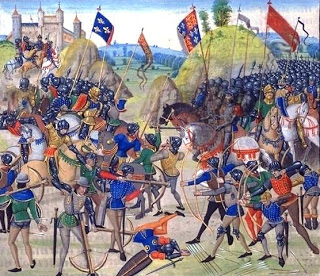Many times discussions of war in role playing games tends to focus on the mechanics of the fighting itself and how to integrate the player characters into it. But I want to touch on an aspect of war that may sometimes be overlooked in an RPG context; the war as background.
In my own Erseta campaign, there are at least five wars, or groups of wars, going on at the moment. Toria is waging a low-level war of independence against the Vostlander invaders that conquered her a generation ago. Vostland and Tamaria despise one another and have been involved in a war that’s lasted for centuries, with occasional outbreaks of peace. The various lands of the Free Lords are constantly raiding, counter-raiding, invading, and generally despoiling one another, with occasional outright conquest (but that’s relatively rare, as it makes the neighbors of both the conquerer and the conquered very nervous). The Roveno nomads are constantly attacking the Nordros and Sudros Border Marches, which are all that stand between them and the rich kingdom of Kelland. And the wars between the various Erian decharchies are as arcane and intricate as their politics, as each attempts to regain the lost glory of the Erian Empire.
War brings chaos, and chaos is good for gaming, because it yields opportunities for adventure. War breeds espionage; spies trading military secrets, troop strengths, plans for fortifications, and the like. PCs are easily drawn into such plots, and the course of a war can pivot on their actions, without their ever needing to command a squad of troops holding a pivotal bridge.
War also breeds a paradoxical lack of civil authority and a waxing of military authority. PCs operating in a war zone will find that the normal operations of border guards, tax collectors, etc. are greatly curtailed if they still exist at all. However, they will also find themselves at the mercy of generals who hold absolute authority, and might either press-gang a group of adventurers into their ranks, or imprison or execute them as suspected spies.
War is famous for its profiteering and looting as well. A city under siege could well pay a fortune for a simple barge-load of grain; it’s just up to the PCs to figure out how to get it there. That same city, once it falls, could be an adventurer’s paradise as the ruins are cleared of conquering troops and the PCs can arrive to pick the carcass clean (or, alternatively, save precious relics from the pitiless looters). Similarly, in the aftermath of a war, there could well be ruins abounding, many with rich treasures in need of liberating by the valiant PCs.
So don’t avoid wars because you’ll then have to figure out how to get the PCs involved. Rather, see wars as opportunities for the PCs to stay out of, directly, in order to find adventure and wealth through their indirect effects.










Great post! An insightful topic. In my Sea Princes game I've given similar thoughts to the issues of piracy and legitimate trade and where PCs fit in.
War also keeps those high-level NPCs busy elsewhere, a nice explanation for players that ask "Isn't there someone else that can fight this menace/perform this mission?"
Very good point Barrataria. I hadn't considered that before.
This is well demonstrated in the movie "The Good, the bad, and the ugly." The Civil War rages in the background as Eastwood and company search for gold.